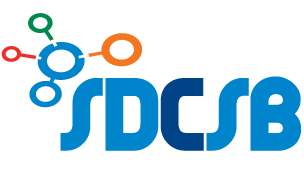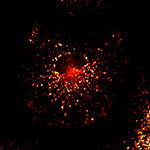Genetics, Bioinformatics and Systems Biology Colloquium
Thursdays, 12:00 pm – 1:00 pm
UC San Diego, Powell-Focht Bioengineering Hall, Fung Auditorium
Complete schedule here
A request for applications was emailed to all UC San Diego Health Sciences faculty in February 2015. We received over 30 applications, for which there were funds for three proposals, representing a <10% acceptance rate. The quality of proposals was outstanding with many of them being highly competitive. Applications were reviewed and scored by several members of the CCBB and the SDCSB, averaging three reviewers per proposal. Each reviewer reviewed multiple applications using an NIH-style scoring system (1 – 9 scale) with the following criteria:
- Significance to Systems Biomedicine
- Innovation
- Investigators
- Responsiveness to the request of applications (RFA)
- Budget
The three RFA’s selected for funding were:
- Gen-Sheng Feng and Kun Zhang: Genomic Analyses of Mutations and Pathways That Drive Hepatocarcinogenesis
- Nathan Lewis and Prashant Mali: Unraveling tissue-specific genetic vulnerabilities in cancers using a combinatorial reverse genetic screening approach
- Dorothy Sears and Marta Jankowska: Nucleotides to Neighborhoods: Obesity-Related Association Networks Spanning Genomes, Behaviors, and Built Environment
Another request for applications is expected to be sent to Health Sciences Faculty in January 2016.
The original RFA can be seen below:
Request For Applications: Demonstration Projects in Systems Biomedicine
Sponsored by the UC San Diego Center for Computational Biology and Bioinformatics
and the San Diego Center for Systems Biology
Overview
The UC San Diego Center for Computational Biology and Bioinformatics (CCBB; compbio.ucsd.edu) and the San Diego Center for Systems Biology (SDCSB; sdcsb.ucsd.edu) have seed funding to initiate and engage in up to three major demonstration¹ projects in Systems Biomedicine. Project proposals are solicited from UC San Diego Health Sciences laboratories wishing to develop and apply systems biology data sets and approaches to address a compelling biomedical question. Successful applicants will work together with SDCSB and CCBB staff to develop the experimental study design, to generate large-scale genome-wide datasets, and to apply state-of-the-art bioinformatics and data mining approaches. Available funds are approximately $200,000 per two-year project. Funds are expected to be split approximately equally between the applicant and core services offered by the SDCSB and CCBB centers.
Goals
Complex diseases are influenced by numerous molecular events which exert their effects through molecular networks1,2,. Systems Biomedicine uses systems-wide data collected from patients, tissues or microbiomes and integrates these data with prior molecular and cellular knowledge the³ molecular network map² to predict outcomes related to health, aging or disease. Funds are available to support projects that will develop new network maps from system-wide data, use networks to guide predictions of phenotypes from genotypes, or both (Figure 1). A particular goal is to engage laboratories with expertise in particular biomedical domains to jointly design and apply systems biomedicine approaches. Representative examples from previous work are provided in the references below 3-8.
Projects will be enabled by a suite of core experimental and computational services to be used together or individually. Core services to be offered are:
1) Genome sequencing, processing, assembly, annotation and variant calling.
2) Generation and integration of systems-wide data to assemble global molecular networks, including AP-MS/MS to identify protein complexes, ChIP-Seq to identify epigenetic and transcriptional regulatory networks, RNA-Seq to identify co-expression networks and genetic interaction screens to identify synthetic lethal and epistatic relationships.
3) Transformation of molecular networks into data-driven gene ontologies, providing a fundamental resource of knowledge for both the program and the scientific community.
4) Tools for genotype-to-phenotype prediction, including classical statistical association and methods guided by prior knowledge in networks and ontologies.
5) Technologies for generating system-wide phenotypes, including functional assays using gene knockouts, knockdowns or drugs.
Examples of relevant topics
· Generating systematic knowledge of hallmark cancer pathways by linking tumor genomes to patient outcomes and responses.
· Using network approaches to study the effects of the microbiome on disease.
· Multiple omics mapping to define key pathways and predictive outcomes in aging or development.
· Integration of system-wide data with imaging data to build a 3D map of the cell.
Submission Information
Due Date: March 31th, 2015
Deliver by email to jbeaudette@nullucsd.edu
Qualifications: UC San Diego Health Sciences Faculty
Format: Four pages. Proposals may use abbreviated NIH structure (Aims, Significance, Innovation, Approach) or similar format.
Content: Proposals should clearly state the significance of the biomedical problem, why it will benefit from a systems approach, and how this work will enable future competitive grant proposals. The proposal should include a succinct description of the research plan along with proposed experiments, methods and analysis. Please list the available reagents and assays to support the research plan or describe the reagents and assays that need to be developed.
Other: A brief budget and faculty NIH biosketch should be included.
Funding and Duration: $200,000 per two-year project
About the Center for Computational Biology and Bioinformatics
The Center for Computational Biology and Bioinformatics supports a world-class program of computational biology research, collaboration and service. It aims to develop and apply bioinformatics tools and methods for integrating diverse data sets, with the ultimate goal of impacting personalized medicine at UC San Diego.
Director: Aaron Chang. Faculty Chair: Trey Ideker.
Website: http:/compbio.ucsd.edu
About the San Diego Center for Systems Biology
The mission of the San Diego Center for Systems Biology is to advance the discipline and application of systems biology in the greater San Diego area and to serve as a nucleus for systems biology education and training. The theme of our research efforts³ From Maps to Models² addresses an important challenge in systems biology: traversing between network maps and mathematical models, two very successful but so far mostly separate biological representations and modes of study. The SDCSB brings together a community of 19 outstanding faculty members along with over 100 trainees and technical staff spanning UCSD, the Salk Institute for Biological Studies, the Sanford-Burnham Medical Research Institute and the Ludwig Institute for Cancer Research.
Director: Trey Ideker. Associate Director: Gurol Suel. Assistant Director: Jason Kreisberg.
Website: http://sdcsb.ucsd.edu/
Figure 1. Overview of a general systems biology approach to medicine. Projects are solicited that address one or both research challenges shown here, involving (1) use of molecular network models to predict phenotype; and/or (2) assembly of molecular network knowledge relevant to a particular human disorder.

References:
1. Carter H, Hofree M, Ideker T. Genotype to phenotype via network analysis. Curr Opin Genet Dev 23(6):611-21 (2013)
2. Ideker, T., Galitski, T., and Hood, L. A New Approach to Decoding Life: Systems Biology. Annual Review of Genomics and Human Genetics, 2:343 (2001)
3. Hofree et al. Network-based stratification of tumor mutations. Nat Methods 10(11) (2013)
4. Novarino et al. Exome sequencing links corticospinal motor neuron disease to common neurodegenerative disorders. Science 343(6170):506-11 (2014)
5. Hannum et al. Genome-wide Methylation Profiles Reveal Quantitative Views of Human Aging Rates. Mol Cell. 2012 Nov 20. pii: S1097-2765(12)00893-3
6. Novershtern et al. Densely Interconnected Transcriptional Circuits Control Cell States in Human Hematopoiesis. Cell 144(2) (2011)
7. Bandyopadhyay et al. Rewiring of genetic networks in response to DNA damage. Science 330:1385-1389 (2010)
8. Konig et al. Global analysis of host-pathogen interactions that regulate early-stage HIV-1 replication. Cell 135(1):49-60 (2008)













